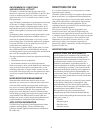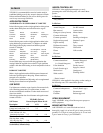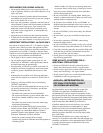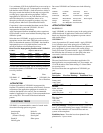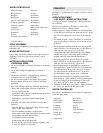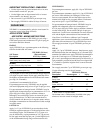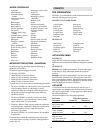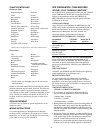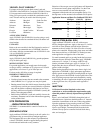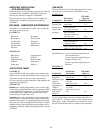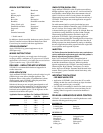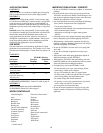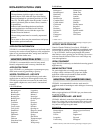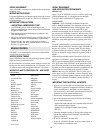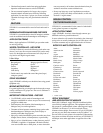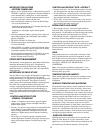
VELPAR L PLUS “GARLON 4”
2
For improved, broad-spectrum brush control, tank mix
VELPAR L with GARLON 4. Consult the VELPAR L Eastern
US site preparation section and the GARLON 4 label for a
listing of crop tree species on which this combination can be
used. This tank mix may be used in the following states:
Alabama Maryland South Carolina
Arkansas Michigan Tennessee
Delaware Minnesota Texas
Florida Mississippi Virginia
Georgia North Carolina Wisconsin
Louisiana Oklahoma
APPLICATION TIMING
Apply VELPAR L plus GARLON 4 from late spring to early
summer after the trees have reached full leaf, but before leaf
tissue hardens.
USE RATES
Refer to the use rate table in the Site Preparation section of
this label for recommended rates of VELPAR L based on
soil texture. Mix the recommended rate of VELPAR L with
4–8 qt of GARLON 4 per acre.
SPRAY EQUIPMENT
Apply VELPAR L plus GARLON 4 by ground equipment
or by air (helicopter only).
MIXING INSTRUCTIONS
For ground application, use enough water for thorough
coverage, usually a minimum of 25 gal per acre. For aerial
applications, use at least 12 gal of water per acre.
For best results, full foliar coverage is required.
IMPORTANT PRECAUTIONS
- VELPAR L + GARLON 4
• Conifers planted sooner than two months after treatment
with GARLON 4 at 1–2 gal per acre may be injured.
• Burning treated sites after initial contact (browning) effect
on foliage may result in poor control. Burn the vegetation
only after brush has completely defoliated at least once,
allowing sufficient root uptake of VELPAR L (usually 60-
90 days after adequate rainfall).
• Before using GARLON 4, read and carefully observe the
cautionary statements and all other information appearing
on the product label.
SITE PREPARATION
- UNDILUTED APPLICATIONS
VELPAR L is recommended for control of brush in site
preparation.
GRID APPLICATION
Apply undiluted VELPAR L directly to the soil surface in a
grid pattern using an exact delivery handgun applicator.
This equipment delivers a thin stream of a predetermined
volume. VELPAR L should be applied during the period
from hardwood bud break to early summer.
Selection of the rate per acre and grid pattern will depend on
soil texture and woody plant composition. Use the lower
rates on coarse textured soils and when the major
component of the hardwoods are susceptible species. Use
the high rates on fine-textured soils and hard-to-kill species.
Application Patterns and Rates For Undiluted VELPAR L
ML/Spot Grid (Ft) Qt/Acre
Coarse 0.6 3 X 3 3
2.0 4 X 4 6
3.1 4 X 6 6
Medium/Fine 1.6 3 X 3 8
2.8 4 X 4 8
3.5 4 X 4 10
5.2 4 X 6 10
SINGLE STEM (BASAL SOIL)
Apply undiluted VELPAR L to the soil with an exact
delivery handgun applicator. Apply at the rate of 2–4 ml for
each inch of stem diameter at breast height. Direct the
treatment to the soil within 3 ft of the root collar of woody
plants to be controlled. When treating large stems and when
more than one delivery of VELPAR L is needed per stem,
make application on opposite sides of the stem.
For multi-stemmed and low-growing brush that have stem
diameters that are difficult to determine, apply VELPAR L
at the rate of 2–4 ml per 3" of canopy width. For tall,
slender (columnar) brush types, apply 4–8 ml per 3" of
height. Base the rate on whichever canopy dimension is
greater (width or height).
When treating brush that requires more than a single 4 ml
application of VELPAR L, apply subsequent applications
equally spaced around the plant. If treating brush on sloped
sites, apply most of the VELPAR L on the uphill side of the
stem. If treating resprouts from brush disturbed by cutting
or shredding, the rate of application should be proportional
to the original tree size, not just the small regrowth of
sprouts.
INJECTION
No Worker Protection Standard worker entry
restrictions or worker notification requirements apply
when this product is directly injected into agricultural
plants.
Inject 1 ml of undiluted VELPAR L through the bark of
undesirable trees. Injections should be made at 4" intervals
around the circumference of the tree. When using tubular
injection equipment, inject near the ground level. When
using the “Hypo-Hatchet” Tree Injector or a similar devise,
inject at waist height. Treatment should be made in the
summer. Woody species controlled include black cherry,
oaks, and sweetgum.
10



